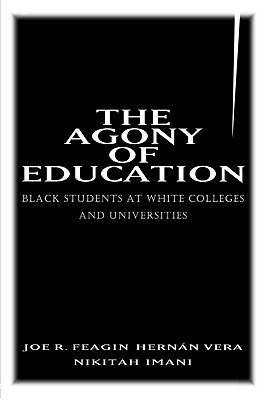
The Agony of Education: Black Students at a White University by Joe R. Feagin, Hernan Vera, and Nikitah Imani (Taylor & Francis, 1996) is a hard book to read. I noted that it has a 1996 copyright and has probably sat on my “unread books” pile for the best part of a decade. The book chronicles the struggles of black students at a predominantly white, large State University that is not identified. The big question for me in reading this book is whether to accept the “racialized society” approach in analyzing the experience of black students. This sees white students as insensitive and at least latently racist, university structures as unfriendly to blacks and favorable to whites, and university administrators and faculty (mostly white) as perpetuators of this system, despite their liberal pretensions.
The evidence of this study makes a strong case for all these structures being in place and making the experience of blacks in such institutions one of agony. Students experience differential treatment from advisors and faculty, are assumed to be there simply because of affirmative action rather than ability, and often get the subtle message of “not welcome here.”
Universities in North America are embedded in a larger social context. One of the unanswered questions in this study for me was how the experience of racialized society effects the “entry posture” of black students coming into white institutions. How do their prior experiences shape their experience of the university?
The authors call for a mix of university leadership, multiculturalism, and greater representation of blacks in faculty and administration as steps toward remedying this situation. The one thing not discussed is the importance of experiential or action-based learning in breaking down racialized structures.
Reading this book sixteen years after its publication date also left me wondering whether there has been progress (or regress) during this time. My own anecdotal observation of the university where I do campus ministry is that there has been good university leadership and a multicultural ethos fostered and yet incidents of racism persist and in listening to black students responses, one senses the continuing pain and frustration over the lack of progress on many fronts, ranging from racial stereotyping to faculty hiring. It seems we are yet a long way from King’s “beloved community.”
Bob Trube is a former Associate Director of Faculty Ministry and Director of the Emerging Scholars Network. He blogs on books regularly at bobonbooks.com. He resides in Columbus, Ohio, with Marilyn and enjoys reading, gardening, choral singing, and plein air painting.

I’ve not read this book — but the notion of “racialization” as a process that directly shapes the experiences and identities of students of color in schools (and society, more broadly) is widely-accepted in the social sciences. I appreciate your review of this text. There are great opportunities to demonstrate the love of Christ across racial and cultural identities. As such, a thoughtful understanding of students’ experiences in our institutions & how those experiences shape or interact with their racial and cultural identities seems like a key prerequisite for approaching these relationships.
Thank you for your comments, La Mont. Since i wrote this review, I’ve become even more deeply convinced of the important role the Christian community has, particularly within universities, in demonstrating the love of Christ and a different way of engaging across racial lines that is not about power and privilege but rather recognizing the dignity and worth of the other. You are right that this begins with understanding the lived experiences and identities of others.